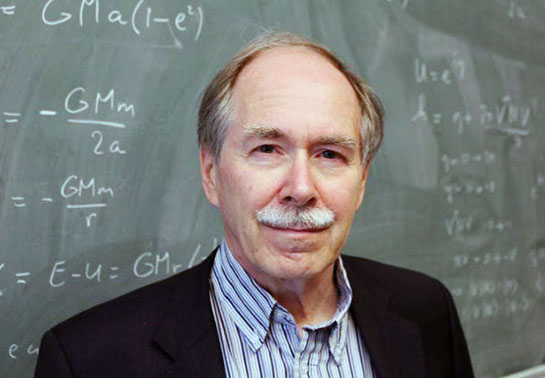Nobel-prize winner Gerard 't Hooft tackles frontiers of Physics in two conferences by the IFIC in València
- Fundació Parc Científic
- November 12nd, 2018

Gerard 't Hooft, winner of the Nobel Prize of Physics, gives two talks on quantum world and black holes at the Science Museum of València and at the Marie Curie Auditorium in the Science Park respectively. The first one (on Tuesday 13 at 7.00 p.m.) will explore the existence of a free will in quantum world. The second one (on Wednesday 14 at 12.30 p.m.) will deal with black holes’ usage as laboratories to test new Physics theories.
't Hooft, who won the Nobel Prize of Physics in 1999, gives two conferences on two current limits of knowledge in Nature and the Universe. On Tuesday 13, the Dutch scientist will expose to the audience the quantum world’s mysterious behaviour at the Science Museum of València. On the next day, he will give a Severo Ochoa Colloquium of the Instituto de Física Corpuscular (IFIC, UV-CSIC) on black holes’ usage as laboratories to test Physics theories. Both conferences are organised by the IFIC, the only Severo Ochoa Centre of Excellence in the Valencian Autonomous Region dedicated to particle, astroparticle and nuclear physics.
Under the title ‘Free will in quantum world?’, the full professor in the University of Utrecht will expose a polemical question to the audience in the Science Museum: the possibility of describing and forecasting the behaviour of essential particles according to quantum mechanics, the part of Physics that studies the behaviour of very small objects such as atoms, molecules and subatomic particles that make them. In this sense, should physicists give up on finding equations that describe with certainty particle’s behaviour? The conference is free entry with previous registration and it will offer simultaneous interpreting into Spanish.
In his conference ‘The quantum black hole as a theoretical laboratory’ at the Marie Curie Auditorium in the Science Park, 't Hooft suggests a way of using black holes as laboratories to test new Physics theories. More precisely, he aims to reconcile Einstein’s Theory of General Relativity with Quantum Mechanics in order to obtain a quantum theory of gravity. This is a specialised conference within the Severo Ochoa Colloquiums cycle of the Instituto de Física Corpuscular.
Gerard ‘t Hooft (Donen Helder, the Netherlands, 1946) is a theoretical physicist and a full professor in the University of Utrecht. He has devoted his career to quantum physics studies in its different aspects: basis, particle physics and quantum theory of gravity. In his doctorate, he developed the dimensional regularisation theory which allowed a prove that the Standard Model is a theory mathematically consistent and able to make predictions. Thank to this technique, it is possible to carry out precision calculations in many quantum field theories, which made him win the Nobel Prize of Physics in 1999 together with his thesis director Martinus Veltman.
The Nobel prize recognises their study for “make electroweak interaction quantum structure clear”, which is one of the essential interactions resulting from merging two of the four forces in the Universe: electromagnetics, between electrically charged particles, and wake interaction, responsible for radioactive processes such as the ones that keep the sun operating). However, 't Hooft contributions go beyond and deal with strong interaction (one of the forces) issues such as quarks that make visible matter of the Universe. Apart from the Nobel, Gerard 't Hooft has received the Wolf Prize, the Lorentz Medal and the Honour Medal of the Niels Bohr Institute of Copenhagen, among others.
The conferences are included in the framework of the Instituto de Física Corpusuclar Centre of Excellence, a mixed centre of the Universitat de València and the CSIC pioneer in particle, astroparticle and nuclear physics research as well as their applications. Takaaki Kajita, Barry Barish, Sheldon L. Glashow and Franck Wilczek, all winners of the Nobel Prize of Physics, have visited the IFIC due to the programme.
More information:
Conference ‘Free will in the quantum world?’ Gerard 't Hooft, Nobel of Physics. Tuesday 13th of November at 7.00 p.m. Santiago Grisolía Auditorium in the Science Museum. Simultaneous interpreting into Spanish. Free entry with previous registration in City of Arts and Sciences website
Severo Ochoa Colloquium IFIC. “The quantum black hole as a theoretical laboratory”. Gerard 't Hooft (Universiteit Utrecht). Wednesday 14th of November at 12.30 p.m. at the Marie Curie Auditorium in the Science Park of the Universitat de València.
File in: Física , Astronomía y Astrofísica
















